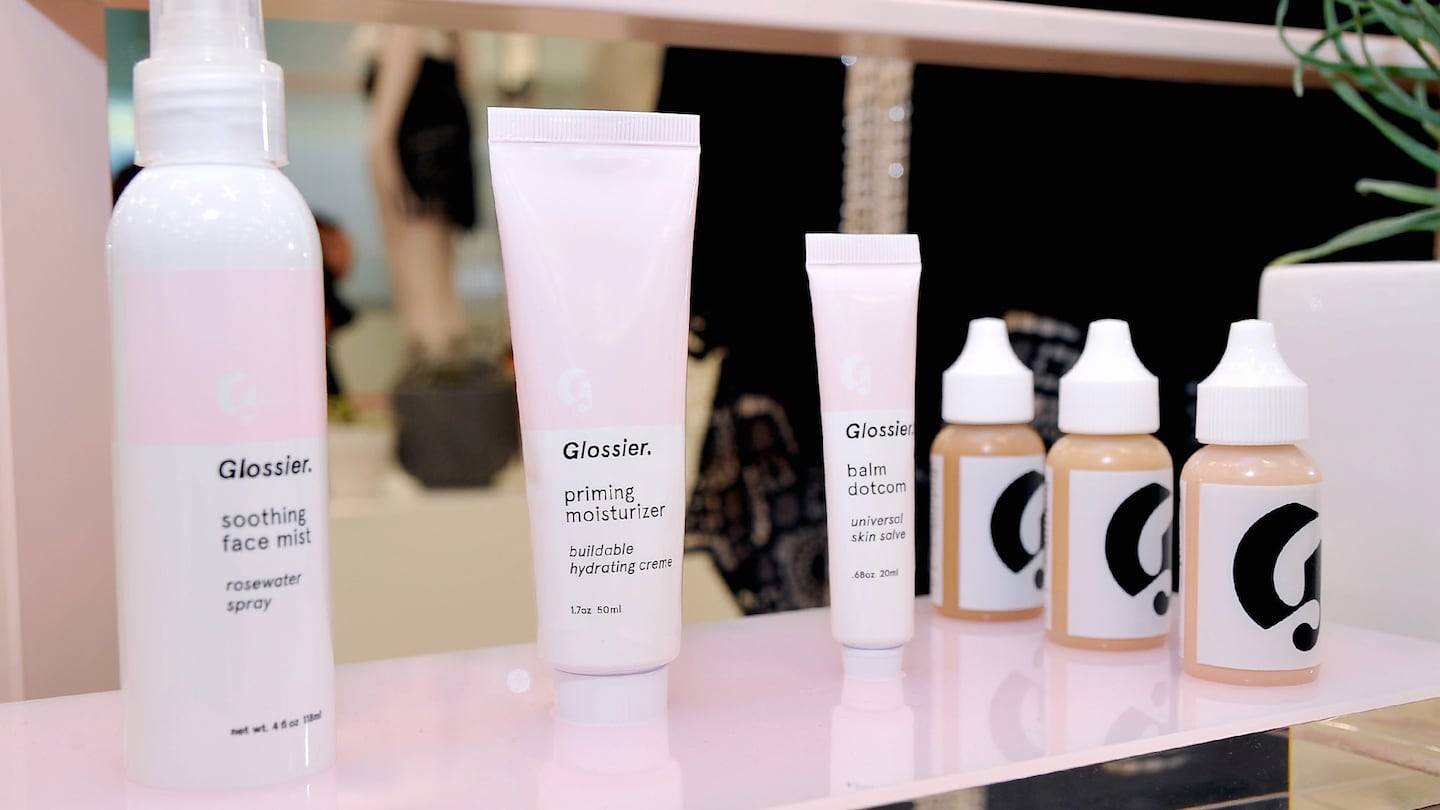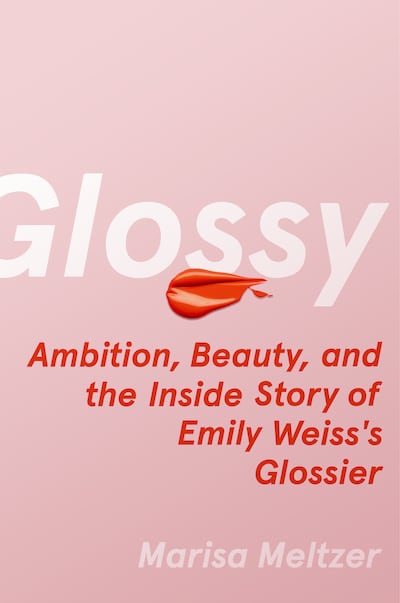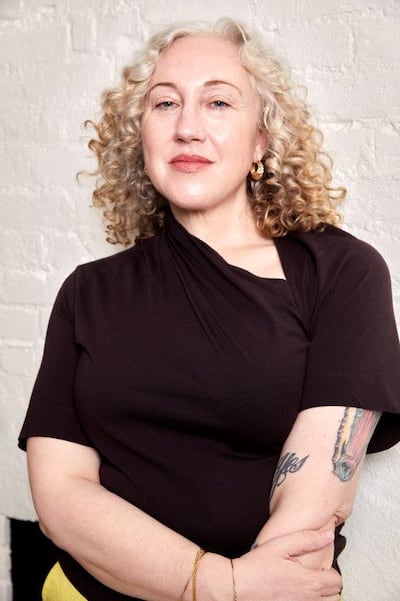
The Business of Fashion
Agenda-setting intelligence, analysis and advice for the global fashion community.

Agenda-setting intelligence, analysis and advice for the global fashion community.

For better or worse, Glossier has dominated the beauty conversation for the last decade.
Glossier always positioned itself as more than a beauty brand. The trouble is, nobody — from its charismatic founder, Emily Weiss, to investors like Forerunner Ventures’ Kirsten Green — could articulate quite what.
First came Into the Gloss in 2010, and its “Top Shelf” column that every beauty insider and outsider wanted to appear in. Then, four years later, its product offshoot, Glossier, that came to define both the direct-to-consumer beauty wave and even millennial pink.
Glossier’s first products, including a multi-use salve smartly called Balm Dotcom, underscored its message that beauty products could be uncomplicated and that shoppers didn’t need to cover themselves up in makeup to look better. A go-at-it-alone, direct-sales model created a relationship with each and every customer. The line’s slogan, “You Look Good,” became a lifestyle.
ADVERTISEMENT
But Weiss, the former Ralph Lauren intern turned blogger turned beauty mogul, didn’t want to be the face of a brand. She wanted to be a “tech philosopher king,” according to journalist Marisa Meltzer, whose book, “Glossy: Ambition, Beauty, and the Inside Story of Emily Weiss’s Glossier,” was released Tuesday.
Those lofty tech ambitions eventually threatened what, in reality, was always Glossier’s core proposition: beauty. It was partly that tension that inspired Meltzer, who had set out to write about the DTC start-up rush and girl bosses, to narrow her focus.
“She would say things to reporters in interviews like, ‘Are we a tech company or are we a beauty company?’ Even as much as she talked about Glossier being a tech company, she would [say] Nike was a lifestyle brand and that Glossier was a lifestyle brand that begins with beauty, but it’s so many other things,” Meltzer told The Business of Beauty. “The reality is that they were a beauty company, and they were selling beauty products, which is not something to be ashamed of. They were pouring huge amounts of money into developing tech for apps and recruiting people for things that never saw the light of day to the point that no one I interviewed could even really tell me what it was supposed to do, or what it was called.”

Meltzer shared her thoughts on Weiss, the company’s tech missteps and the cultural relevance of Glossier today, as well as an excerpt of her new book.
The Business of Beauty: You describe Emily Weiss as a cipher. Why did you think there was a market for a book about her?
Marisa Meltzer: People would ask about what she’s really like, more than almost anyone else I’ve interviewed. I’ve written cover stories on Zendaya and Emily Blunt. It was because there was something really unknowable about her even to people who followed her career. I wanted to try to understand what drove her ambition and made her tick, and what made her want to be in the public eye and what made her want to recede from the public eye.
She’s a person that in many ways defies explanation. She would post [on Instagram] about how she loves airplane food but didn’t do “get ready with me” [videos]. She’s really resisted the kind of classic women-in-business promotional tropes, like having to do a spread of, “Here’s the outfits I wear in seven days,” and some kind of Domino or Architectural Digest home tour, as a way to promote herself. She pretty early on didn’t want to be shown that way.
I think that her answer to a lot of that stuff was like, “If I were a man, would people ask these questions?” And I think the answer is actually they would, because there is this interest in male founders like Mark Zuckerberg or Elon Musk or Jack Dorsey. She wanted to be seen in a league with these tech philosopher-king types and not like with Vicky Tsai from Tatcha or Tiffany [Masterson] from Drunk Elephant.
ADVERTISEMENT
The Business of Beauty: Glossier arguably became a cultural phenomenon because it went beyond beauty. Why do you think that ultimately was also part of its undoing?
MM: Even though Drunk Elephant and Charlotte Tilbury were playing by more established beauty-company rules and were being acquired for enormous sums of money, Emily Weiss was really resisting that, I think, to IPO, and to be seen as something more than just a beauty mogul. That was a mistake that ultimately led to her being forced out of the company [as CEO] and probably for Glossier to lose out on a potential acquisition when the market was at its peak and when Glossier was the hottest brand.
Now that Emily has stepped down and Glossier has these business-school grads — so-called adults — running it, their party line is, “We’re not trying to do an app. We are a beauty company. We are partnering with Sephora as a retail partner. We are playing by the rules.” I believe a lot of that is to get the company looking good towards a future acquisition or to make up for some of the flat or lost momentum.
The Business of Beauty: Glossier is doing well at Sephora and is expected to hit $275 million or more in revenue this year, but can the brand be as relevant as it once was?
MM: Personally, I go into Sephora, and I feel a little nonplussed. I just look around and I think Glossier looks like Glossier, but so does Ilia a little bit. I made a list of every brand that kind of looked like Glossier at Sephora and there were like 15 brands on it. It’s not even so much that they’re all copying each other; it’s just they’re all kind of working with the dominant aesthetics that already feel a little bit outdated. When you’re in Sephora with the music and all the people, Glossier is just one of many. It all just feels like maybe they’re just a normal beauty company, maybe they’re not this whole thing.
But there’s no way for them to have the kind of name recognition that they want without being all over the place, especially in this market. You’re seeing brands like Aesop being acquired, but what they have is huge name recognition in places like Asia. Glossier has probably zero. They’ve never had a pop-up there. They don’t have distribution. Glossier actually has quite a bit of catching up to do to be popular. It is a little unsettling when you’re in a Sephora [for them] because why would you choose Glossier over Rare Beauty or [Sol de Janeiro] Bum Bum cream?
I think it could be less cool and a larger brand at the same time. I often think about a lot of brands like that, but in particular, MAC cosmetics. When I discovered them, it was the mid or late ‘90s. It was long after they were founded and acquired. I really knew nothing about their origin, makeup artists or activism. I just saw the shade of eyeshadow that Natalie Imbruglia had worn in the “Torn” video, and some cool lipsticks and thought, “Wow, this is really made for me. This is my brand.” I think if you had talked to a woman who was in Toronto using MAC in the late ‘80s, they would have thought it was a little passé and moved on to something cooler because their glory days were in the past. But that wasn’t my truth when I discovered them and they probably were bigger than ever.
I do think that Glossier has that potential to spread in size, but [it has to] start innovating and having products that excite people to keep that momentum no matter what. Glossier is going to get older and dabble in whatever it’s going to dabble in, but there’s going to be this core fan base of teenagers and people in college and their early 20s who keep aging into and then maybe out of the brand.
ADVERTISEMENT

Emily Weiss visibly squirmed when I asked her about the billion-dollar valuation in summer 2019. “That is, like, a decision of the company and what you think you’re valued at,” she said. “It’s, like, a decision that ultimately whoever’s paying for it, the venture capitalist prices it, right? They’re the ones who decide. It doesn’t mean anything. It’s like a stock price. Stock prices go up and down.” I was surprised that she was reluctant to discuss unicorn status. I tried another tactic, asking her how she celebrated moments like that. Do you cry? Do you do a little dance? Did you go out to dinner? “Honestly, it’s kind of like back to business, that’s how I feel,” she said. “Raising money is not success; raising money is fuel for success.” Glossier was one of just twenty-one female-led companies that were christened unicorns in 2019, including Away, Rent the Runway, and The RealReal. It would be all too convenient to say that Glossier’s success made it easier for subsequent female-led teams to get venture capital funding, but that wasn’t the case. Less than 2 percent of venture capital investment went to all-female founding teams in 2021 (itself a five-year low), and Black founders received only 1.3 percent of venture capital funding in that same year.
Glossier wasn’t the only beauty company to achieve a billion-dollar valuation, and around the same time, the large beauty conglomerates like L’Oréal and Estée Lauder were on something of a buying spree, gobbling up independent companies and it didn’t always go well. Rodin Olio Lusso, which was bought by Lauder in 2014 for an undisclosed sum, was a brand championed by Into the Gloss. It was started in 2008 by Linda Rodin, a tall and lithe silver-haired former model and stylist who started making a face oil in the bathroom of her Manhattan apartment and sold it in art deco–inspired packaging. Lauder expanded the line, as is customary upon acquisition, launching lipsticks and hand and body creams. It was not a success, not to early fans, not to critics, and not financially. Lauder quietly shuttered the line in 2021.
From Glossier’s inception, the company was an acquisitions target, or at least one constantly talked about. By 2019, Glossier had raised so much money that very few companies could afford to acquire it. The better question was, of those that could afford it, whom would Weiss approve of? In 2018, she said, “Typically when you sell to a larger conglomerate, it’s because you need more distribution … We don’t need that. We create our own channel through our digital platform.”
The products manufactured could be household names, but what does the potential scale of a beauty company like Glossier look like? In 2019, Weiss wouldn’t elaborate on that. “Mainly our business will be beauty for the foreseeable future. It’s just about reaching more people. We have very, very low brand awareness, even in the United States, but we’re still young … If you look at a company like Nike, I mean, that’s what is possible for our future.”
Glossier was exemplary for its user experience, all of it was custom-coded. With its strong web design, Glossier had proven it could sell beauty online to enthusiastic customers and technology was a big part of that. As Glossier’s product line grew, it required more time, workers, money to maintain. But that didn’t require a $100 million Series D funding round.
Weiss wanted to establish Glossier as more than a beauty company; she wanted to prove that it could be a disruptive tech company. What it produced wouldn’t be beauty or lifestyle products but something even less tangible that was potentially more valuable. “I think the better way to interpret ‘we are a tech company’ is they wanted to lead with innovation,” said Kirsten Green of Forerunner.
Part of Weiss’s original pitch to Green had been a nebulous commerce–meets–social media network for beauty fans. One iteration of the app development was a community app through which users could connect. Someone suggested that it could help people with shade-matching for their skin tone, and another version was developed around the idea of recognizing products, whether it was in a photo of a user’s medicine cabinet or a popular “get ready with me” videos; products could be automatically detected and purchased through Glossier.
Weiss was a leader who relied on her intuition, but she couldn’t land on what Glossier as a tech company, or an app, meant. The development of a blockbuster beauty product like Milk Jelly Cleanser involved a meticulous eye for detail, but tech was often about getting a rough early version out in front of people as quickly as possible. Perfectionism was a liability.
Not a single person I interviewed could answer whether the app had been given an actual name. “It felt like there were constant plot twists,” said one former creative employee. Glossier’s company culture was secretive, but particularly around the app development there was a marked lack of communication. One day a decision would be made about a minute design detail, and the next Weiss would say in a meeting that she had reconsidered it overnight.
One of their strategies to become a tech company was to hire for it, and they recruited aggressively in 2018 and 2019. Keith Peiris, a former product manager at Facebook and Instagram, was one of the first Glossier employees to come from a blue-chip tech company. Peiris lasted only six months at Glossier and was replaced by Facebook alum Maykel Loomans. Melissa Eamer came from holding various positions at Amazon for nineteen years to be the COO; another Amazon veteran, Pawan Uppuluri, replaced Mahoney as CTO after he left in 2019. Hiring big-tech execs sent a strong statement that Glossier was making rigorous, data-driven decisions. These splashy hires were feathers in Weiss’s cap, but none of them stayed very long.
The HR department was busy trying to redo titles, levels, and salaries to remain competitive. Some major hires were even offered interior designers for their apartments to lure them to New York City. “You get to a point where you want to attract major talent — Amazon, Facebook, Instagram execs — you have to figure out creative ways to get them to come on board,” said one employee. Glossier couldn’t compete in salaries with those companies, so they offered “middle-to- top-of-the-market” equity packages and hoped the prestige of working there might be enough.
Something very real that Glossier could uniquely offer was a staff filled with women in power. “There were female CFOs, VPs of products. What other company executive leadership table could you look around and everyone is a woman?” said the employee. Outside of the company’s leadership, 50 percent of the engineering team was female, a number unheard-of at most companies.
But Glossier functioned as two different companies that were in fact on two different floors: one for tech and one for basically everyone else. They felt doom and gloom about the app, while they viewed Weiss as optimistic to the point of ignorance.
Marisa Meltzer is a journalist based in New York who has covered beauty, fashion, wellness and celebrity for publications such as The New York Times, The New Yorker and The Guardian. “Glossy: Ambition, Beauty, and the Inside Story of Emily Weiss’s Glossier” is published by One Signal Publishers, a division of Simon & Schuster, Inc. Available September 12, 2023.
Black founders carry a markedly higher burden when it comes to educating investors on the value and viability of their business ideas — but there is an art and science behind knowing when your brand is ready and what kind of investors will be the best fit.
Landing a retail partnership is often seen as a major milestone for beauty founders — but it brings a bevy of new challenges, from the logistical complexities to setting a marketing budget. Black entrepreneurs, who typically have far less capital to work with, often face tough choices.
The firm has been working on a listing since at least 2022, with previous attempts buffeted by volatile markets.
In a three-part series, The Business of Beauty explores how Black founders Monique Rodriguez, Danessa Myricks and more built, launched and scaled their multi-million-dollar businesses. In part one, a look at how these entrepreneurs found their niche and harnessed early lessons that were critical to their growth